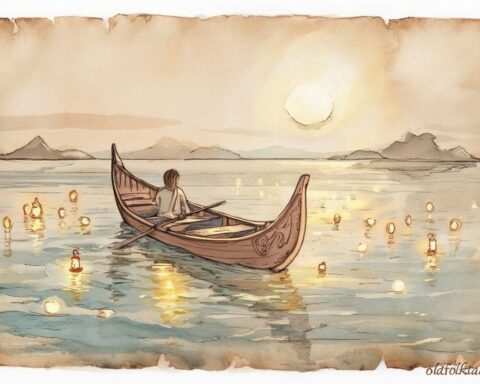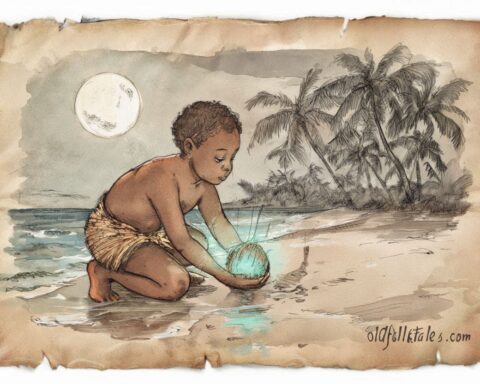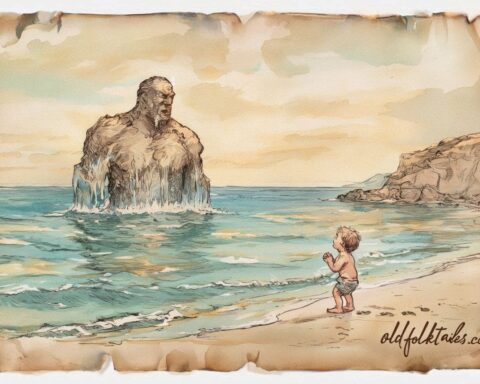Before time knew days and nights, the sea never slept. Waves climbed over mountains and devoured whole villages. Storms spun without end, and even the moon hid behind clouds to escape the roar.
The people of Kiribati lived on tiny islands that floated like beads on a necklace, and every morning they rebuilt what the waves destroyed.
Among them lived Tereana, a young woman with a voice as calm as wind through pandanus leaves. Each dawn she sang while she fished in the shallows, her song somehow steady even when the waves were not.
One night, as she sang to her nets, the water beneath her shimmered blue and a voice rose from the depths.
“Why do you sing to me?” asked the Sea, vast and weary.
“So you remember to be gentle,” said Tereana, though she trembled.
“I was not made for stillness,” said the Sea. “The sky pulls, the moon commands, the winds tease. I am never free to rest.”
“Then let me teach you,” said Tereana. “Even wind can hush, even hearts can pause.”
The Sea laughed—a sound that shattered coral. “You would teach me?”
But Tereana did not run. She dropped her oar and began to hum, low and even, like a cradle song. The tune wove through the spray and salt until even the wind faltered to listen.
The Sea’s rage slowed. “Sing again,” it said softly.
For seven nights, Tereana sang, her voice shaping the waves into long rolling sighs. On the eighth, the Sea grew quiet for the first time since creation.
“Your song has bound me,” it said. “What shall I give you?”
“Nothing,” said Tereana. “Only promise to rest sometimes, so life may grow.”
The Sea thought deeply. “Rest is new to me. How will I know when?”
She smiled. “When the moon grows thin, sleep. When it fattens, wake.”
The Sea nodded. “Then so it shall be. And to remember your kindness, I will leave behind my smallest breath each time I rest.”
The next morning, the people found the ocean calm, and on the shore, tiny pools shimmered—the Sea’s breath, trapped in shells.
Tereana never returned from her final song. Some say she became the first tide, forever rocking the ocean between waking and sleep.
Since then, when the sea goes still under a thin moon, the islanders whisper, “Tereana sings again.”
Moral of the Story
Peace is not the absence of power—it is its rhythm. Even the mightiest must learn when to rest.
Knowledge Check
1. What was the Sea’s nature before Tereana’s song?
It never rested—constantly storming and destroying.
2. How did Tereana calm the Sea?
By singing a steady song for seven nights.
3. What agreement did they make?
That the Sea would rest during the thin moon and awaken with the full.
4. What did the Sea leave behind as a sign of gratitude?
Shell pools on the shore, its “smallest breath.”
5. What became of Tereana?
She vanished into the waves, becoming part of the tides.
6. What does this tale teach?
That balance and rest give strength even to the greatest forces.
Origin: Kiribati (Micronesian oral tradition)






